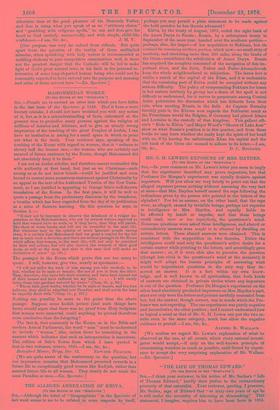perhaps you may permit a plain statement to be made
against the bold paradox he has therein advanced ?
Khiva, by the treaty of August, 1873, ceded the right bank of the Amou Darya to Russia•; Russia, by a subsequent treaty in September of the same year, handed over the southern portion— perhaps, also, the larger—of her acquisition to Bokbara, but she retained the remaining northern portion, which now—no small strip of territory, and stretching more than 200 miles along the banks of the Oxus—constitutes the subdivision of Amou Darya. Russia has acquired the complete command of the navigation of this im- portant river, and the forts, Nukus and Petro-Alexandrovsk keep the whole neighbourhood in subjection. The latter fort is within a march of the capital of the Khan, and it is undeniable that the remaining part of Khiva could be occupied without any serious difficulty. The policy of compensating Bokhara for losses in her eastern territory by giving her a share of the spoil is not difficult to understand, for it serves to perpetuate among Centaal Asian potentates the discussion which has hitherto been their ruin when meeting Russia in the field. As Captain Burnaby forcibly puts it, the Khivan now regards the Bokharist much as the Frenchman would the Belgian, if Germany had placed Alsace and Lorraine in the custody of that kingdom. This gallant offi- cer's " Ride to Khiva "and Major Wood's "Shores of Lake Aral" show us what Russia's position is in this quarter, and from these books we may learn whether she really kept the spirit of her bond with us, if by leaving the unfortunate Khan his capital and the left bank of the Oxus she seemed to adhere to its letter,—I am,


































 Previous page
Previous page